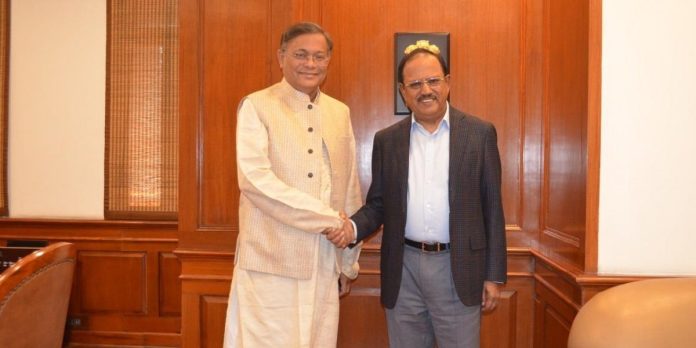New Delhi: The intense fighting inside Myanmar dominated the Bangladesh foreign minister’s talks with the Indian leadership, with both Dhaka and New Delhi worried over its spillover in the region.
On his first visit abroad after the general elections in Bangladesh, foreign minister Hasan Mahmud observed that the situation in Myanmar was “getting worse day by day”.
After meeting with Indian National Security Advisor Ajit Doval on February 7, Mahmud told reporters that both countries shared their concerns over Myanmar.
“The situation in Myanmar is a worrying factor for both countries because we share a border with Myanmar,” he said, adding that it was discussed that peace in Myanmar was necessary for regional peace and stability.
The fighting in Myanmar between the ruling Junta and ethnic armed forces has often spilt across the border into Bangladesh and with civilians and security personnel fleeing the violence.
A day earlier, Bangladesh summoned the Myanmar ambassador after two Bangladesh citizens were killed in mortar shell firing from across the border.
They also are under talks on how to return the hundreds of Myanmar security personnel who fled into Bangladesh to escape the fighting with the rebel Arakan Army.
“So far, until today as many as 338 people, mostly Myanmar border security guards and army personnel, had entered Bangladesh, and we gave them shelter with consultation to take them back,” he said.
The Bangladeshi minister noted that they were deliberating the best means, whether by sea or air, to facilitate their return home.
A day earlier, India had issued a travel advisory asking all citizens to leave Myanmar’s Rakhine province due to the deteriorating security situation.
In Rakhine State, the military junta is facing its toughest challenge after the Arakan Army, representing the Rakhine ethnic minority, ended a ceasefire last November. As part of the Three Brotherhood Alliance, a coalition of ethnic minority armies, the Arakan Army launched attacks on border outposts and townships, achieving notable victories against the military, which took control from the civilian government in February 2020.
Mahmud also met with his counterpart, external affairs minister S. Jaishankar, who also hosted a dinner in his honour.
According to the MEA readout, the agenda for discussions included cross-border connectivity, economic and development partnership, cooperation in defence and security, power, energy, water resources and people-to-people exchanges.
“They expressed commitment to further enhance their collaboration to promote sub-regional cooperation within the framework of BIMSTEC, IORA and BBIN,” said the MEA statement.







































